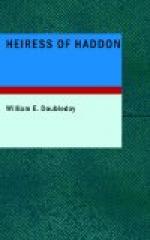Without a halt he arrived at Matlock at just about the same time as his companion reached Haddon, and reining up his steed at the village inn close by the churchyard, he alighted for a short rest and some refreshment ere he finished what remained of his journey.
He was well known here, and his peremptory commands were obeyed with the utmost alacrity.
His first enquiry was about Sir Thomas Stanley, and he learned to his satisfaction that he had passed safely through there a good hour or so before.
“In good sooth, your lordship is surely going no further to-night,” exclaimed the host, as Sir George made the preliminary preparation for resuming his journey.
“Tut, man, why not? Of course I shall.”
“Your horse is stabled,” responded the landlord; “surely you will not attempt to ride further to-night.”
“My horse stabled,” thundered the baron, “I said not so; ’tis fresh from Derby. Out with it, man, and let me away.”
The horse was quickly unstabled, and brought round to the tavern door, but the innkeeper was loth to let the good knight depart. It was a thing he would not do for a trifle, and he feared for the safety of the baron.
“The roads are very bad,” he exclaimed, as they stepped into the little passage together, “and it will be dark ere you reach the Hall, my lord. Had you not better change your mind?”
The knight declined the request in the most emphatic manner, and placed his foot upon the stirrup to mount.
“There be many rogues and footpads in the neighbourhood of late, and especially to-day,” pursued the other. “I have had as ill-looking a crew in my house to-day as I ever clapt eyes upon; I am sure they bode no good.”
Nothing, however, could persuade Sir George to stay, and seeing that his guest was obdurate, the host continued,
“Stay awhile, Sir George, an’ thou wilt, thou shalt at least have a man of mine to accompany thee. The neighbourhood is full of knaves of late, and I like it not that thou should’st go alone.”
But the offer was lightly refused; and fearing nothing for his own safety, the old knight spurred his horse forward, and in a few moments was lost to sight in the fast-settling gloom.
Little time as he and Sir Thomas had lost in leaving London, and quick as they had been in reaching Derby, there had yet been those who had been more expeditious than they.
Upon the receipt of the unwelcome news which the ostler had brought to them, Edmund Wynne’s confederates at once departed from the city, and under the leadership of Sir Ronald Bury hastened on, with few rests, to the wilds of Derbyshire, to perform the deed, still enshrouded in mystery, which they had been hired, if necessary, to perform.
Blissfully unconscious of the trap into which he was rushing, and wholly contemptuous of the idea of being benighted, the lord of Haddon rode fearlessly on. The way was dark to be sure, but he knew it well, and what added to his confidence was the fact that he was right in the very heart of his own possessions.




